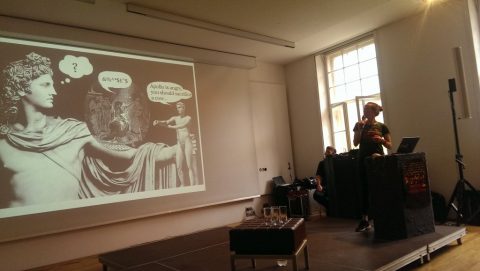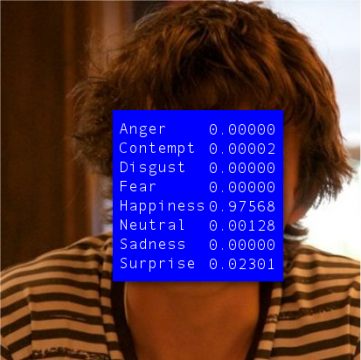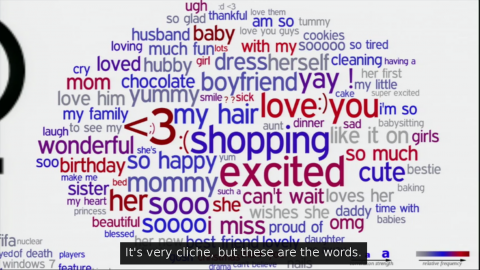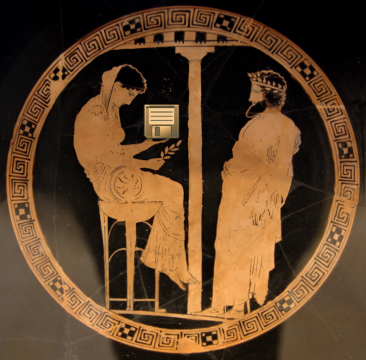Art Meets Radical Openness, SERVUS.AT, Linz (AT)



28.05.16 from 19.00 til 21.00
Art Meets Radical Openness Festival by Servus.at
AFO Linz Austria
A Contemporary Delphic Oracle
Presentation by Marloes de Valk, Ruben van de Ven, Manetta Berends and Christina Cochior
We have become our own Big Brother. Hoarding information about ourselves in an attempt to improve our performance is only the tip of the iceberg. It doesn’t explain the obsessive dedication with which we, even post-Snowden, share intimate details about ourselves to an often not too clearly defined group of others. We are hyper-consumers, our houses are bursting at the seams, our data bodies morbidly obese. Metaphors like the Cloud promise infinite liposuction, delegating the storage of our excesses to what seems like outer space, not unlike our attics and self-storage boxes hide the excesses of our material consumerism. What are we hoping to find in this unfathomable amount of data? Do we even search or only accumulate? Are we putting together a treasure, a source of invaluable knowledge for future generations, or are we handing them our waste?

When in doubt, humans have always turned their heads towards godly or mythical agents, in order to make sense of their surroundings, structure their perceptions and answer their questions. However, not only were the divine messages given by these agents mediated and interpreted by human subjects, these mediations were validated through institutionalisation. Procedures, or rituals, were put in place to obfuscate the human hand in the generation of the message, thereby formalising the outcome as an objective one. Although disputed, it is commonly believed that the Delphic oracle delivered messages from her god Apollo in a state of trance, induced by intoxicating vapors arising from the chasm over which she was seated. Possessed by her god the oracle spoke, ecstatically and spontaneously. Priests of the temple translated her words into the prophecies the seekers of advice were sent home with.
The stories tonight argue how three ‘Big Data’ applications can be seen as modern day Delphic oracles, software designed to help us make important decisions by claiming to quantify the unquantifiable, seemingly analysing but mostly interpreting in their own peculiar way the ultimately human, pluriform and complex communications found in facial expression and text. What kind of traces will these data-gathering practices leave? What will the future ruins of our modern day oracles look like?

Ruben van de Ven will present his research on emotion analysis software. What do the emotional parameters derived from facial expressions really mean? When examining how the claims made by companies producing the software relate to the concept of emotion, it is revealed how a modern day oracle is constructed. What are the possible implications if companies, scientists and governments start believing they know how you feel?

Manetta Berends’ research shows how text mining software is far from simply reading results from large bodies of data. Instead the software, together with the researcher using it, is actually constructing and steering results. When closely examining the processes underlying text mining and knowledge discovery in data, it becomes clear how much the researcher is influencing instead of witnessing the process of knowledge discovery. The data speaks gibberish, the processes are messy and the results experimental.

Cristina Cochior will talk about the ease with which people accept rules when they are both made impersonal through the use of bots, and personal by anthropomorphising these bots. As a case-study, she uses the “warrior of justice” ClueBot NG, battling vandalism on Wikipedia. A story that dives head first into the black box of neural networks, battles between programmers and vandals, and the human tragedy of false positives.

Fast forward to the future… where Marloes de Valk will look at what remains of our archives, the data centers hosting the data gathered about us, our hard disks and how the contents will be interpreted by future generations. Our data fetish and reliance on technology will have been replaced by a pure need for solutions to deal with our heritage: a planet several degrees warmer, resource-drained and polluted. But no despair, we’re past the tipping point, so no doubt it’s time for action.